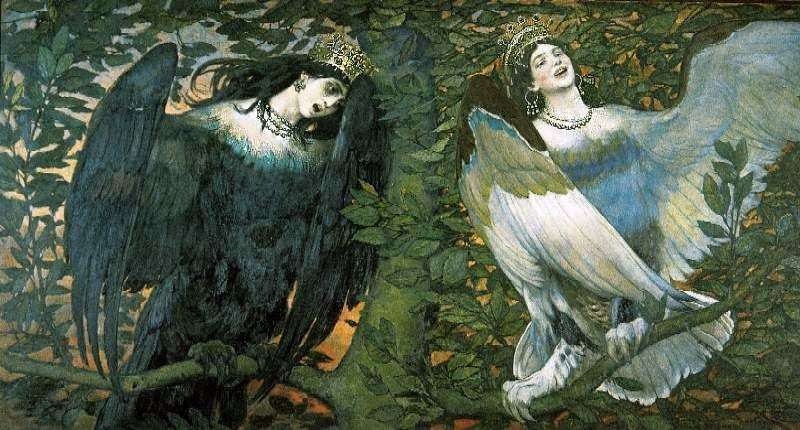
The traditional Slavic symbols of joy and sorrow were two birds of paradise: Sirin and Alkonost. In the Orthodox besties about the “sirines” it is said that these semi-people are half-birds, bisexual, singing so sweet songs that those who hear them lose their minds, go to the voice, not noticing the way, falls into the water and dies. According to another version: he forgets his life, goes into the desert and, lost, dies.
Sirins or pitchfork – the spirits of water springs, able to fly. Subsequently, this tribe in Russian lubke turns into one single bird. In the legends of Western Europe, the bird Sirin is considered to be the embodiment of an unhappy soul. Its name can easily be correlated with the Greek “sirens”, legends about which could be brought to Ancient Rus by merchants who walked along the rivers from Byzantium and Greece.
Sirens are predatory beauties with the head and body of a beautiful woman and clawed bird’s paws. They are the daughter of the ruler of the fresh waters of Aheloy and one of the Muses. From the father they inherited a wild and spiteful temper, and from the mother a divine voice. With their magical singing, the sirens lured mariners to their island – they smashed ships about coastal reefs, and themselves perished in whirlpools or in the claws of temptresses. Sirens in antiquity are often depicted on tombstones and called the Muses of the Underworld.
About the Alkonost, in the Orthodox tradition, it is reported that this is a bird that lays its eggs in the depths of the sea in the middle of winter, and these eggs are CELEBRATE – do not spoil and rise up as soon as the time comes. The alconost is not looking down from the surface of the water and is waiting for the ascent, because it is very difficult to steal the egg of Alkonost. If it succeeds, then such an egg people hang under the chandelier in the church, which is a symbol of the integrity and unity of all the people coming into it.
Bird Alkonost is an example of God’s Mercy and divine providence, therefore in those seven days when the Alkonost of his children is looking out, the sea is calm. The ships are valued these days and called Alkonostsky or Alkionov. The last name allows us to correlate the origin of Alkonost with the Greek legend of Queen Alkion. The daughter of the God of Wind Aeolus, the wife of King Keik, the queen of Trachina, Alkion, vainly tries to dissuade her husband from a sea pilgrimage trip to the sanctuary of Apollo of Claros in Asia Minor. Keik falls into a storm and dies with all his companions.
Alkion long months waiting for her husband on the beach, to which his body takes out. After that, Alkion rises to the cliff and throws him into the sea. The gods have mercy on Alcyone and the water has touched not the female body, but the feathers from the wing of the kingfisher. Alcyone means “kingfisher”. This bird carries eggs and incubates chicks in winter, builds nests on the seashore.
Singing Alkonost is joyful as she promises Paradise. Singing Sirin, as medieval sources point out, pinching, Sirin misses the lost Paradise, asks for a return to heaven. In modern culture, Sirin and Alkonost are inseparable, these are the established symbols of Sorrowful and Joyful singing.
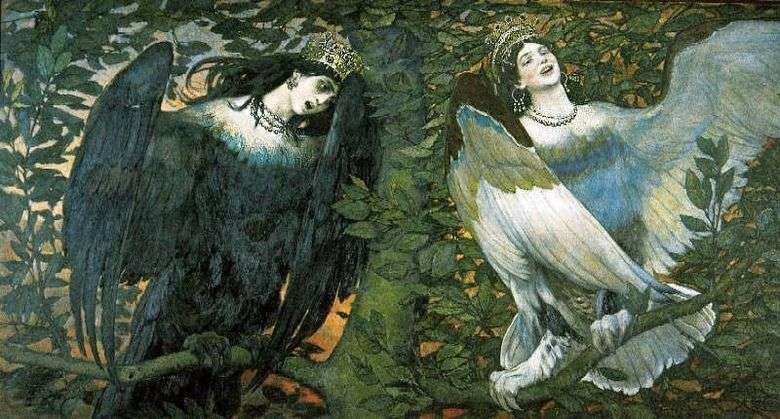 Sirin y Alkonost. Canción de alegría y dolor – V. M. Vasnetsov
Sirin y Alkonost. Canción de alegría y dolor – V. M. Vasnetsov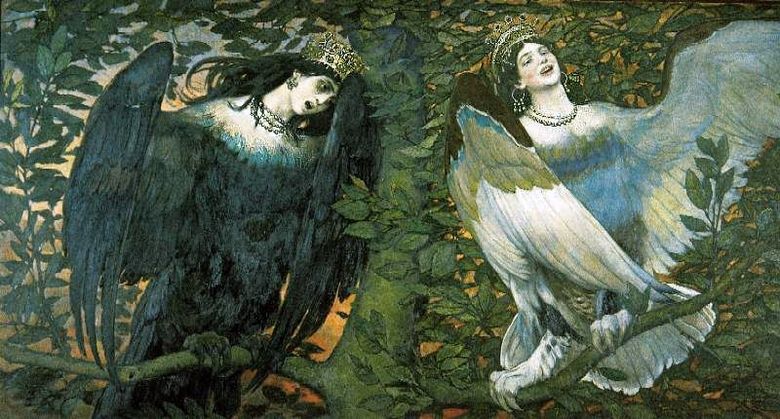 Sirin et Alkonost. Une chanson de joie et de tristesse – V. M. Vasnetsov
Sirin et Alkonost. Une chanson de joie et de tristesse – V. M. Vasnetsov Bird in a cage by Nicola Lancre
Bird in a cage by Nicola Lancre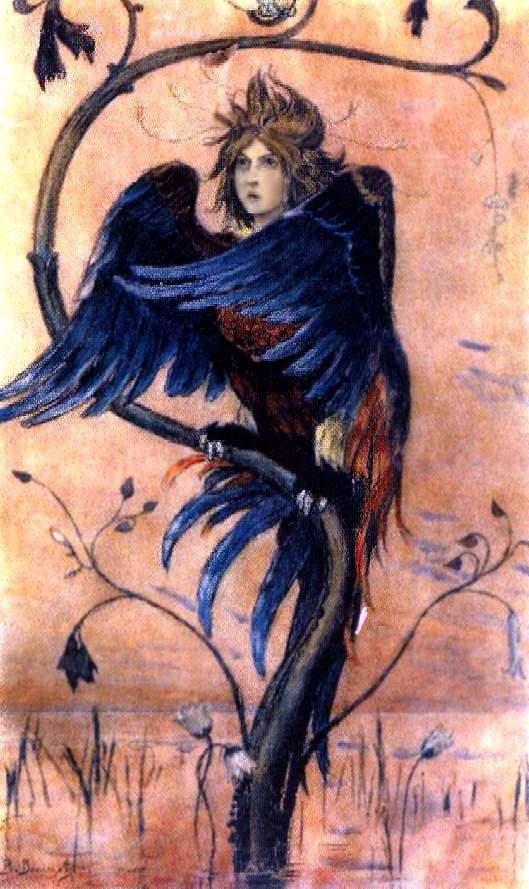 Gamayun, a prophetic bird by Victor Vasnetsov
Gamayun, a prophetic bird by Victor Vasnetsov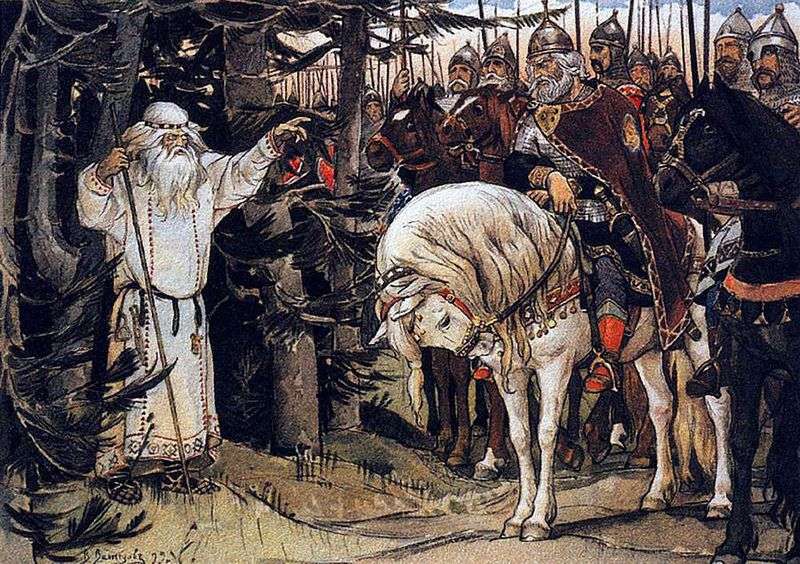 A Song about Oleg’s Thing by Victor Vasnetsov
A Song about Oleg’s Thing by Victor Vasnetsov Fisherman and Siren by Frederick Leighton
Fisherman and Siren by Frederick Leighton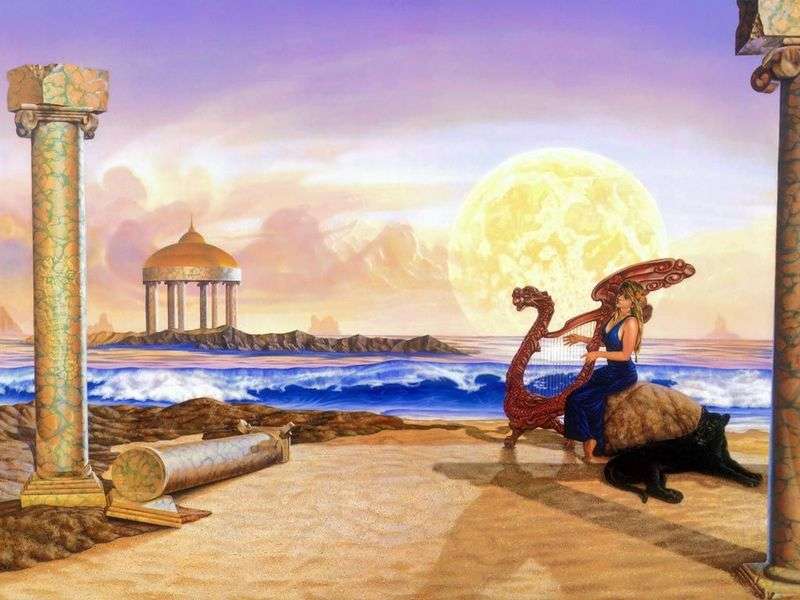 Song of Cecilia by Berkeley Shaw
Song of Cecilia by Berkeley Shaw Stone Age by Victor Vasnetsov
Stone Age by Victor Vasnetsov